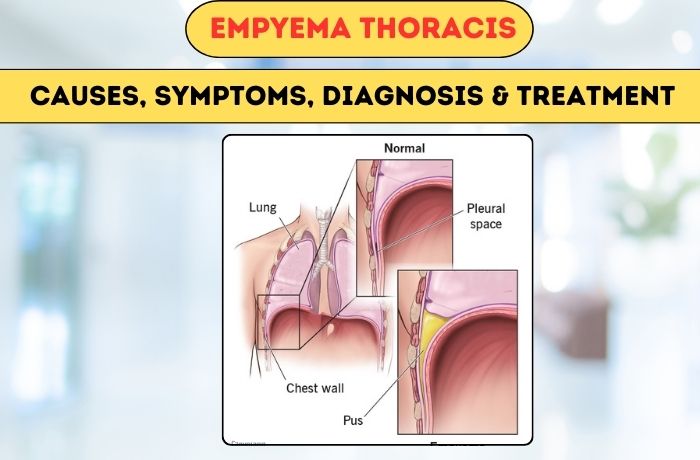Empyema Thoracis: Causes, Symptoms, Treatment

Welcome, readers, to a complete guide to a medical condition that demands our attention: Empyema Thoracis. While the name may sound scary, understanding this condition is crucial for everyone. Empyema thoracis refers to the accumulation of pus in the pleural space, the cavity surrounding the lungs. This condition can have serious consequences if left untreated, but fear not! In this blog, we’ll take a closer look at its causes, symptoms, diagnosis, and treatment options.
What is Empyema Thoracis?
Empyema thoracis, commonly referred to as just “empyema,” is a condition characterized by the accumulation of pus in the pleural cavity, the space between the outer surface of the lung and the inner lining of the chest wall. This accumulation often occurs as a result of a bacterial infection in the lungs, typically following pneumonia. The presence of pus in this space can cause breathing difficulties and other serious health issues if not promptly addressed.
Causes of Empyema Thoracis:
- Pneumonia: The most common cause of Empyema Thoracic is bacterial pneumonia. When pneumonia goes untreated or is not adequately treated, bacteria can spread from the lungs to the pleural cavity, leading to the formation of pus.
- Lung Infections: Besides pneumonia, other lung infections such as tuberculosis can also lead to Empyema Thoracic by allowing bacteria to enter the pleural space.
- Chest Trauma: Injuries to the chest, such as rib fractures or penetrating wounds, can create openings through which bacteria can enter the pleural cavity, causing infection and pus accumulation.
- Surgical Procedures: Thoracic surgeries or medical interventions involving the chest area may increase the risk of Empyema Thoracic if bacteria are introduced into the pleural space during the procedure.
Symptoms of Empyema Thoracis:
Recognizing the signs of empyema thoracis is important for early detection and treatment. Common symptoms include:
Fever: Often accompanied by chills and sweating.
Chest Pain: Sharp pain that worsens with breathing or coughing.
Cough: Productive cough, with sputum that may be yellow, green, or bloody.
Shortness of Breath: Difficulty breathing, especially during physical activity.
Fatigue: Feeling unusually tired or weak.
Decreased Appetite: Loss of appetite and unintended weight loss.
Treatment Options for Empyema Thoracis:
Treatment for thoracic empyema typically involves a combination of medical treatments and procedures aimed at removing the infection and draining the accumulated fluid. These may include:
- Antibiotics: Targeted antibiotic treatment is prescribed to combat the underlying bacterial infection responsible for Empyema Thoracic.
- Thoracentesis or Chest Tube Insertion: To drain the pus and fluid buildup from the pleural cavity, healthcare providers may perform a thoracentesis to remove the fluid or insert a chest tube to facilitate ongoing drainage.
- Surgery (pleurectomy or decortication): In severe cases or when other treatments fail to resolve the condition, surgical intervention may be necessary to remove infected tissue, break up loculated collections of pus, or repair any underlying anatomical abnormalities contributing to the Empyema.
Suggested Specialist:
When it comes to the diagnosis and treatment of pediatric surgical conditions like empyema thoracis, seeking the expertise of a skilled and compassionate specialist is paramount. Dr. Apoorva Kulkarni, a renowned pediatric surgeon in Thane, stands out as a beacon of excellence in the field. With extensive experience and a patient-centric approach, Dr. Kulkarni offers complete care and innovative solutions to ensure the well-being of her young patients.
In conclusion :
Empyema Thoracis is a serious condition that requires prompt attention and appropriate treatment. By understanding its causes, recognizing its symptoms, and seeking timely medical intervention, we can effectively manage this condition and prevent complications. Remember, early detection and treatment are key to a successful recovery. If you or a loved one are facing Empyema Thoracis, don’t hesitate to consult with a specialist like Dr. Apoorva Kulkarni for expert care and support. Stay informed, stay proactive, and prioritize your health.
